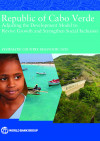Cabo Verde’s economic achievements over the last thirty years have been spectacular and are unprecedented on the African continent. These achievements are remarkable given the unique challenges the country faces due to its small size, lack of scale for production of goods and delivery of economic and social services, remoteness, geographical dispersion, environmental fragility, and high exposure to shocks.
This Systemic Country Diagnostic (SCD) presents an assessment of the main opportunities and constraints for achieving the World Bank’s twin goals in Cabo Verde. It assesses the pathways for reducing extreme poverty and raising the welfare of the poorest forty percent of the population in a sustainable manner, and identifies the main constraints for operationalizing these. The SCD is based on a review of existing documents, analysis of available data, and in-country discussions and expert interviews that took place during 2016 and 2017. The SCD focuses on the country’s development potential and challenges to meeting the objectives of poverty reduction and shared posterity. It lays the ground for the program of collaboration between Cabo Verde and the World Bank, namely the 2018–2021 country partnership framework.
